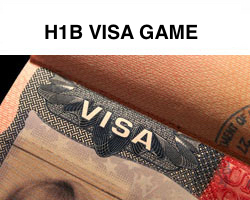
Many of the visas are given out through a lottery, and a small number of giant global outsourcing companies had flooded the system with applications, significantly increasing their chances of success.
Congress set up the H-1B program to help US companies hire foreigners with exceptional skills, to fill open jobs and to help their businesses grow. But the program has been failing many US employers who cannot get visas for foreigners with the special skills they need.
Instead, the outsourcing firms are increasingly dominating the program, federal records show. In recent years, they have obtained many thousands of the visas – which are limited to 85,000 a year – by learning to game the H-1B system without breaking the rules, researchers and lawyers said.
OUT OF LUCK
“The H-1B program is critical as a way for employers to fill skill gaps and for really talented people to come to the United States,” said Ronil Hira, a professor at Howard University who studies visa programs. “But the outsourcing companies are squeezing out legitimate users of the program,” he said. “The H-1Bs are actually pushing jobs offshore.”
Those firms have used the visas to bring their employees, mostly from India, for large contracts to take over work at US businesses. And as the share of H-1B visas obtained by outsourcing firms has grown, more Americans say they are being put out of work, or are seeing their jobs moved overseas.
Of the 20 companies that received the most H-1B visas in 2014, 13 were global outsourcing operators, according to an analysis of federal records by Hira. The top 20 companies took nearly 40 per cent of the visas available – about 32,000 – while more than 10,000 other employers received far fewer visas each. And about half of the applications in 2014 were rejected entirely because the quota had been met.
Among the immigration visas offered by the United States, the H-1B program stands out for its peculiar rules. The annual quota includes 65,000 visas for foreign workers applying for the first time, while the remaining 20,000 are for foreign students graduating with advanced degrees from US universities. Each year the period for applications opens on April 1, and they are accepted on a first-come, first-served basis.
COMPUTER-RUN LOTTERY
Federal officials allow only one application for each foreign worker. But there is no limit on the number of visas a single company can seek. A company with thousands of employees can submit many applications. By law, if applications quickly exceed the quota, officials turn to a computer-run lottery to select the visa recipients.
Immigration officials do not acknowledge the outsourcing companies’ advantage and how they have understand the lottery game. Because of the lottery scheme post 2013; they have started putting so many more applications than they need just to improve their winning chances.




The actual situation is much worse than you think.
Prior to 1990, almost all Indian immigrants to the USA were either PhDs or PhD candidates. Today, most Indian immigrants are H1-Bs, half of whom are dalits and half of whom are homosexuals. Worse than that, most of the H1-Bs are being imported for the purpose of replacing American workers.
As a result of this, increasing numbers of Americans regard India as a hostile country. This will have many side effects, starting with a refusal to provide “swap lines” to support the rupee, a lack of interest in free trade agreements with India, and both overt and covert opposition to anything like India becoming a member of the Security Council.
The H1-B visa program has created a situation in which many Americans regard Indians as fundamentally dishonest and where rich Indians are regarded as a special sort of criminal.
The H1-B visa program is doing enormous harm to India’s image in North America.
Two things: a) Nothing wrong if the people are homosexual, b) nothing wrong if they are Dalits. Anyway, your statement about Indians coming now being Dalits and homosexuals is totally false. Having said that, it is true that the H-1B system has been badly exploited. It is certainly not being used to bring the best and brightest. Prior to 1990, it was mainly to get PhDs and top class people. The H-1B system has certainly caused many problems for the people here but then the politicians and rich are to blame. The rest of your statement about supporting of the rupee and its link to H-1B is complete bs. This is an example of extrapolating all problems to one issue,